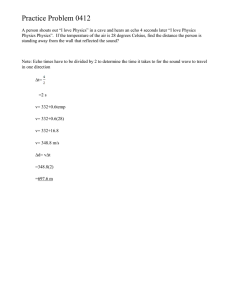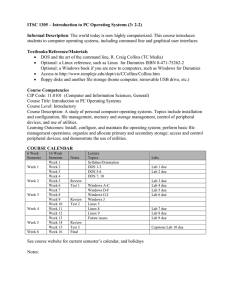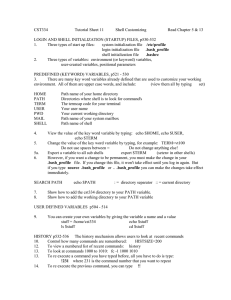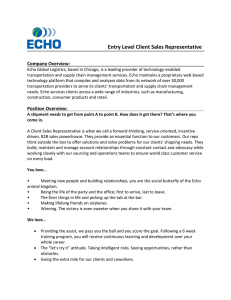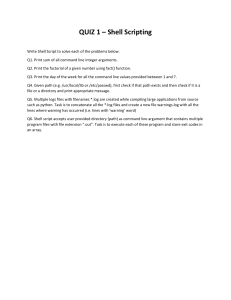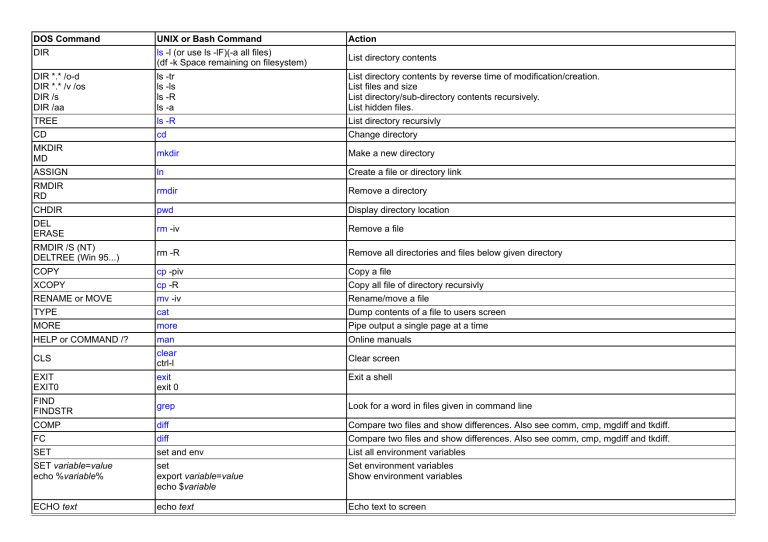
DOS Command DIR UNIX or Bash Command ls -l (or use ls -lF)(-a all files) (df -k Space remaining on filesystem) ls -tr ls -ls ls -R ls -a ls -R Action CD MKDIR MD cd Change directory mkdir Make a new directory ASSIGN RMDIR RD CHDIR ln Create a file or directory link rmdir Remove a directory pwd Display directory location rm -iv Remove a file rm -R Remove all directories and files below given directory cp -piv cp -R mv -iv cat more man clear ctrl-l exit exit 0 Copy a file Copy all file of directory recursivly Rename/move a file Dump contents of a file to users screen Pipe output a single page at a time Online manuals grep Look for a word in files given in command line diff diff set and env set export variable=value echo $variable Compare two files and show differences. Also see comm, cmp, mgdiff and tkdiff. Compare two files and show differences. Also see comm, cmp, mgdiff and tkdiff. List all environment variables Set environment variables Show environment variables echo text Echo text to screen DIR *.* /o-d DIR *.* /v /os DIR /s DIR /aa TREE DEL ERASE RMDIR /S (NT) DELTREE (Win 95...) COPY XCOPY RENAME or MOVE TYPE MORE HELP or COMMAND /? CLS EXIT EXIT0 FIND FINDSTR COMP FC SET SET variable=value echo %variable% ECHO text List directory contents List directory contents by reverse time of modification/creation. List files and size List directory/sub-directory contents recursively. List hidden files. List directory recursivly Clear screen Exit a shell SET variable setenv (for C shell) or export VAR=val (for Korn shell. Also VAR=val) Set environment variables PATH PATH %PATH%;C:\DIR echo $PATH PATH=$PATH:/dir Display search path for executables. Set PATH environment variable. PROMPT $p$g export PS1='\h(\u)\W> ' Set user command prompt. DATE or TIME DOSKEY /h date history Show date. (also set date - DOS only) List command history DOSKEY NAME=command alias NAME=command Set command alias BREAK ON trap Trap ctrl-break / Trap signals. SORT sort Sort data alphabetically/numerically EDLIN ed Line mode editor pico, gnp, vi, xedit, xemacs,dtpad Edit a file. The Linux editor which looks most like DOS edit is probably Pico. (Not a recomendation!) EDIT filename.txt BACKUP files A:\ RESTORE A:\ files ATTRIB [+r|-r] [+a|-a] [+s|-s] [path\file] /s ATTRIB +h or -h PRINT CALL COMMAND /C (DOS), CMD (NT) MEM TASKLIST (WIN2K, XP) MSD SCANDISK DEFRAG C: CHDISK FDISK SUBST V: C:\directory\path FORMAT tar -cvf /dev/fd0 files mdir, mcopy doswrite -a file (AIX only) tar -xvf /dev/fd0 files mdir, mcopy dosread -a file (AIX only) Save files to floppy. See Using DOS floppies Read files from floppy. See Using DOS floppies chmod Change file permissions. DOS: +:set to -:remove r:Read only a:Archive s:System /s:recursively mv file .file lpr source script (cshrc) . script (bash) sh script free top ps -aux top lsdev fsck debugfs du -s fdisk Change file to a hidden file - rename file with prefix "." Print a file mount mke2fs See: fdformat and mformat for floppies Mount a drive letter to a folder/directory on your hard drive. Format drive file system. For floppy drive use see YoLinux Tutorial Using DOS Floppies with Linux Execute script from within batch shell. Show free memory on system List executable name, process ID number and memory usage of active processes Show system info (Command borrowed from AIX) Check and repair hard drive file system Disk usage. Tool to partition a hard drive. uname -a echo $SHELL cat /etc/issue Operating system/shell version tar and zip Compress and uncompress files/directories. Use tar to create compilation of a directory before compressing. Linux also has compress, gzip HOSTNAME PING hostname ping Print host name of computer Send packets to a network host TRACERT traceroute ifconfig or ip addr show Show routes and router hops to given network destination. VER pkzip IPCONFIG (NT) WINIPCFG (Win 95...) Display/configure network interface NBTSTAT (Netbios info: -n, - nslookup host-name c) host host-name NBTSTAT -A IP-address NBTSTAT -a hostname nmblookup -A hostname Print DNS info for host. ROUTE PRINT NET HELP START NET STARTservice-name NET STOPservice-name NET SHARES NET SEND <node-name> <message> (NT) route -n chkconfig --list |grep on service service-name start service service-name stop df smbclient -M MS-Windows-host-name talk Print routing table. List services. WIN REBOOT startx shutdown -r now Start X-Windows. Reboot system. lookup NetBIOS names. Start/stop service/daemon. Show mounted shares/filesystems. Send pop-up to a MS/Windows PC Send message to another Unix/Linux user. See YoLinux tutorial To find out how to do something on UNIX simply type "man -k subject_matter". This will do a key word search for all commands dealing with the subject matter. Then use the appropriate command. Online manuals are available on all the commands by typing "man command_name". MS/Windows info: http://www.mcmcse.com/ http://www.techtutorials.net/ Shell Descriptor/Operators: DOS Descriptor/Operator UNIX or Bash Descriptor/Operator Description \ / Directory path delimiter .\ ./ Current directory ..\ ctrl-z ../ ctrl-d Parent directory End of file/close shell ctrl-c ctrl-c Interrupt/process break * ? * ? file name wild card Single character wild card %VAR% %1 %2 %3 $VAR $1 $2 $3 Variable prefix First, second and third shell command line arguments. / | > | > Command line option flag prefix Pipe stdout redirection >> < >> < stdout redirection overwrite stdin redirection Shell Script Operators: DOS Operator UNIX or Bash Operator Description set +v Set verbose mode off. -v: Echo each line of shell script as it is executed. $ # command line argument prefix. DOS: %1 Bash: $1 for firs argument. Comment. (Not processed.) == !==! = != string "equal to" comparison string "not equal to" comparison NOT CHOICE ! case negative of test expression case/switch statement @ ECHO OFF % REM IF IF EXIST C:\filename if [[ test-resulting-in-bool ]]; if-test then If file exists ... IF NOT EXIST C:\filename elif ...; If file does not exist. then ... else ... fi if [ -e /dir/filename ]; then if [ ! -e /dir/filename ]; then GOTO ABC ... :ABC goto ABC ... :ABC Branch FOR ... IN ... DO FOR %%fff IN (C:\dir\*.*) DO echo %%fff for ffiillee in lliisstt; For loop do ...; done for (( expr1; expr2; expr3; )) do ...; done ERRORLEVEL $? exit status/return code PAUSE sleep sleep for specified interval Bash shell aliases for DOS users: following are bash shell aliases which can be added to the system profile or the user's personal profile ($HOME/.bashrc) to correct and help DOS users on Linux. alias alias alias alias alias alias alias alias alias alias alias alias alias alias dir="echo 'Use the command: ls -lF'" tree="echo 'Use the command: ls -R'" del="echo 'Use the command: rm -iv'" move="echo 'Use the command: mv -iv'" rename="echo 'Use the command: mv -iv'" copy="echo 'Use the command: cp -piv'" type="echo 'Use the command: cat'" cls="echo 'Use the command: clear'" mem="echo 'Use the command: free'" ver="echo 'Use the command: uname -a'" A:="echo 'Use the command: mdir a:'" a:="A:" C:="echo 'No C drive in Linux. Go to your home directory with the command: cd'" c:="C:" Devices: DOS Device Linux Device Description NUL /dev/null Send into nothingness CON stdin stdin from console PRN LPT1 /dev/lp0 First printer device COM1 /dev/ttyS0 Firsst serial port Equivalent Linux and MS/Windows GUI Applications: The MS/Windows Command C:\WINDOWS\cmd Linux Command gnome-terminal konsole Description Command Text Terminal C:\WINDOWS\explorer c:\Program Files\Internet Explorer\iexplore nautilus --no-desktop firefox mozilla File browser Web browser C:\WINDOWS\notepad gedit C:\Program Files\Windows NT\Accessories\wordpad Text editor C:\Program Files\Microsoft Office\Office10\winword excel powerpnt MS/Office and Open Office suites (ooffice) oowriter oocalc ooimpress C:\Program Files\Adobe\Acrobat 7.0\Reader\acrord32 acroread mspaint tuxpaint xfig gimp Adobe PDF viewer Graphics and painting program C:\Program Files\WinZip\winzip32 file-roller File compress / decompress / pack / unpack taskmgr ksysguard Process and system load monitor qps gnome-system-monitor xosview
